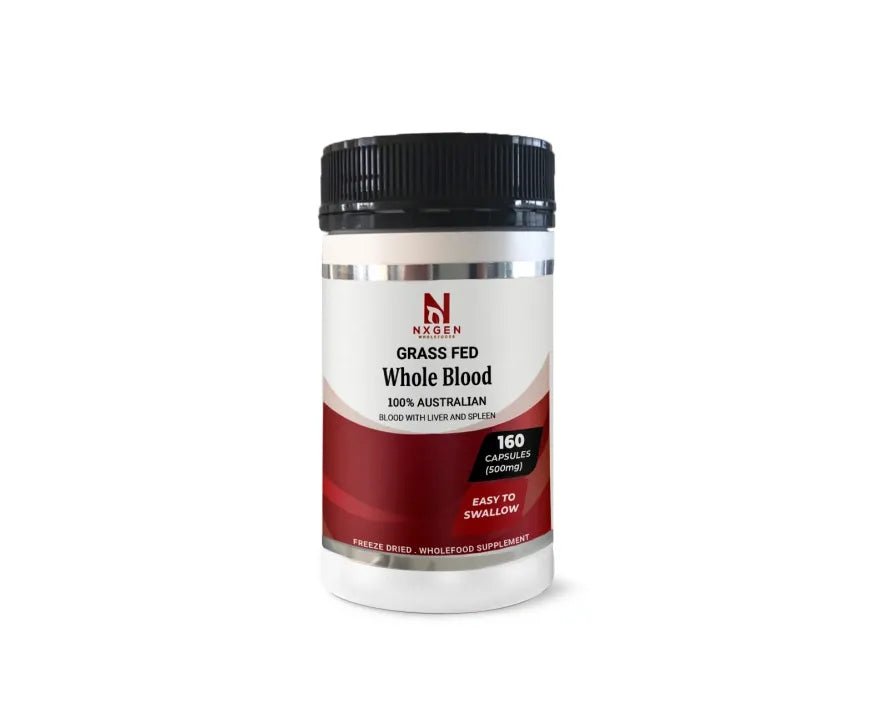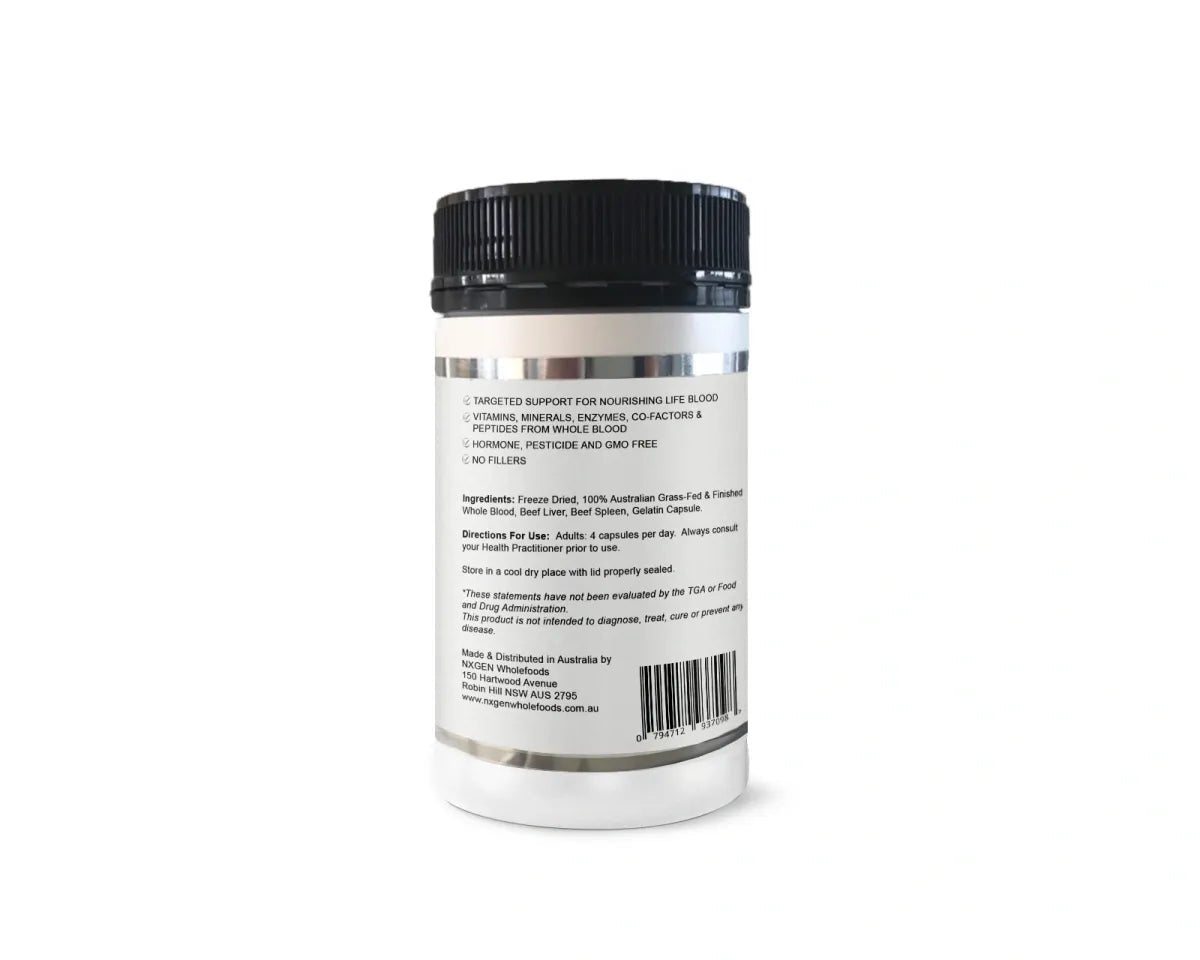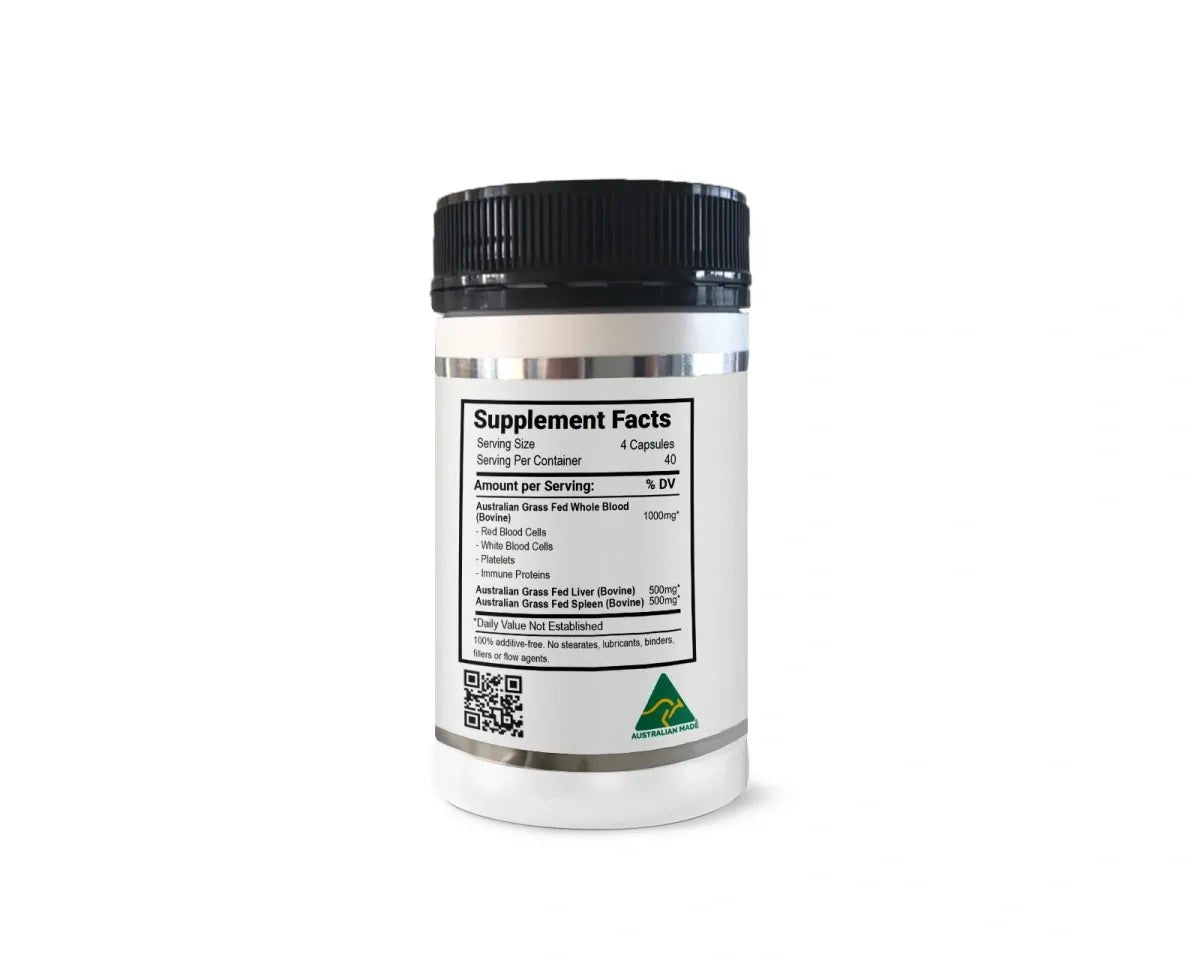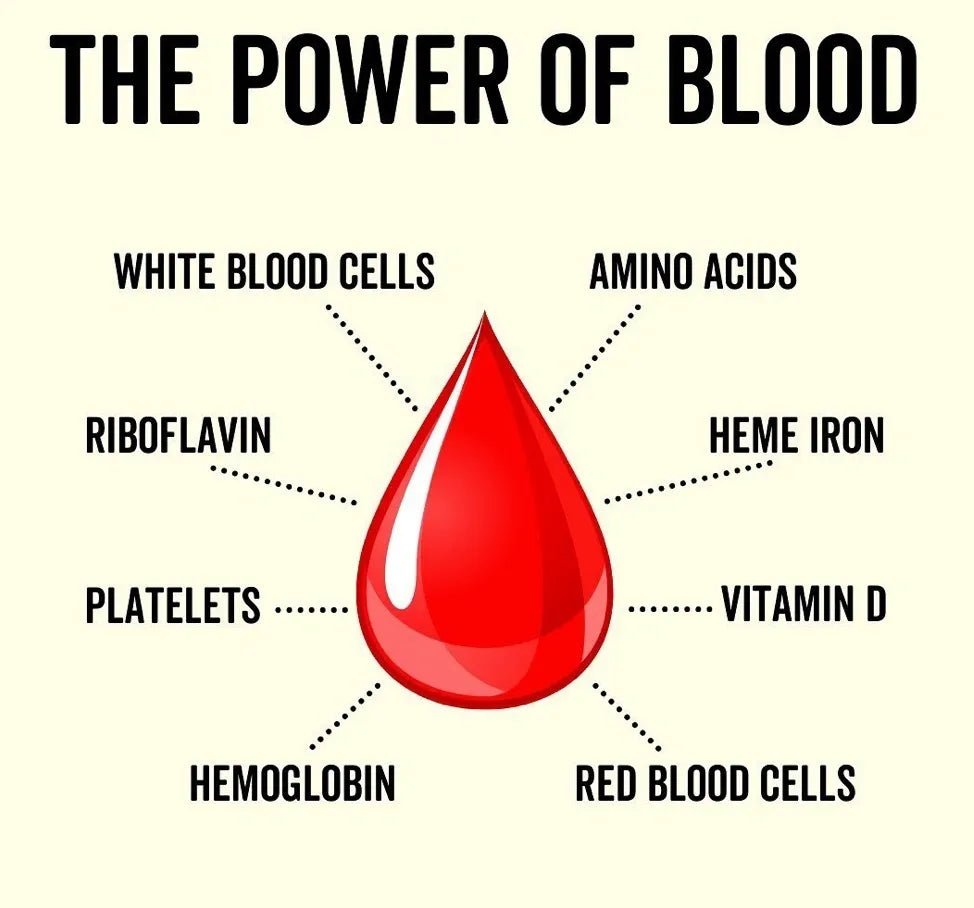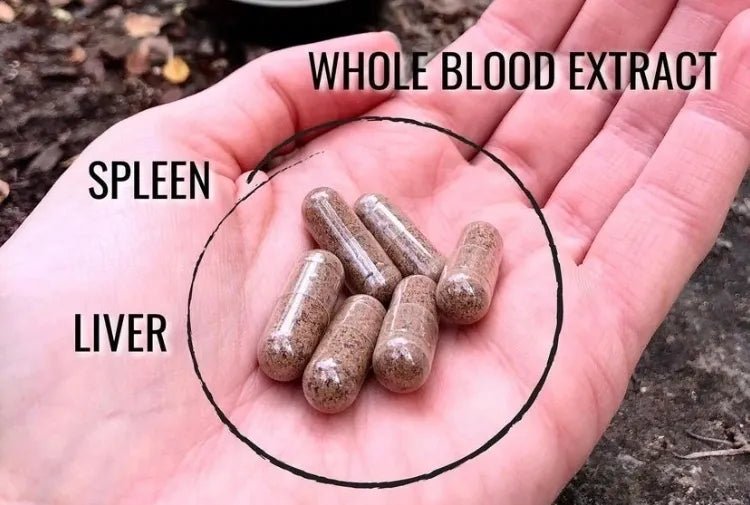WHOLE BLOOD contains bioavailable heme iron along with red blood cells to improve iron stores and to aid oxygen delivery to cellular tissues. Especially important for endurance and for people with anaemia.
Consuming Blood may nourish and support our own Blood, Liver, and Spleen.
- Whole Blood is rich in Bio-available Heme Iron, Vitamin B-12 and Bio-Identical Vitamin D.
- Supports Red Blood Cell Formation, Immune Function and Cardiovascular Health*
- Includes Liver & Spleen that provide the cofactors to support both endogenous iron production and hemoglobin health.
Traditional cultures consumed blood to nourish their own blood and increase their red blood cell to increase oxygen carrying ability. The principle of consuming like for like organs was used to reverse degenerative complications by ingesting the corresponding raw materials specific to that organ / gland.*[Royal Lee]
Consuming Whole Blood, with Liver and Spleen provides Bio-Available Heme Iron, Vitamin B-12, and Bio-identical Vitamin D to supports red blood cell formation, immune function and cardiovascular health.
Whole Blood contains red and white blood cells as the building blocks to form healthy blood, to improve iron status, to help fight off infections and strengthen immunity.*
— Based on the ancient ancient wisdom that "like supports like," Consuming whole blood may support our own blood* —
— Provides the bioactive building blocks to support red blood cell and white blood cell formation, for cardiovascular health* —
— Includes liver for bioavailable copper, soluble vitamin A plus B vitamins, to aid iron mobilisation for haemoglobin health* —
— Includes spleen for tuftsin and spenopentin peptides to support immune function * —
Supplemental blood is rich in Vitamin B12, CoQ10, bio-identical Vitamin D and it is nature's most concentrated source of heme iron. The combination of blood, liver and spleen in Whole Blood provides your body with essential vitamins, minerals, enzymes and co-factors that contribute to normal blood formation and are beneficial for iron metabolism. The recommended dose is 4 capsules per day which may be taken during or between meals.
Benefits
- Contains 100% organs & blood tissues derived from grass-fed cattle from Australia
- Iron and vitamin B12 support red blood cell production
- Iron contributes to normal oxygen transported within the body
- Vitamin D contributes to normal blood calcium levels
- Vitamin A helps to maintain good iron levels in the blood
- Vitamin K2 contributes to normal blood clotting
- Formulated pure: without fillers but with quality ingredients
- No pesticides or hormones;GMO-free
Eating Nose to Tail
For all who pursue a sustainable, ethical and healthy lifestyle, the head-to-tail principle, or evolutionary eating, presents an interesting starting point when eating animal products. When we feed ourselves in this inclusive way, we not only ensure that as little meat as possible is lost, eating animal organs also corresponds to the ancient human tradition of eating organ meat because of the high concentration of nutrients in it. The knowledge that organ meats are extremely rich in essential nutrients already existed among many ancient civilisations. Animal organs, for example, contain high concentrations of the fat-soluble vitamins A, D, K and E, as well as magnesium, iron, choline, iodine and vitamin B12. Of all of these nutrients most people following a typical Western diet can use some extras. Moreover, the specific composition of nutrients of an animal organ is in line with the nutrients that the same organ in the human body is in need of.
Why You Need Whole Blood?
Whole blood is a blood builder that supports iron metabolism and red blood cell count. It contains bioavailable Heme Iron an essential mineral and an important component of haemoglobin, the substance in red blood cells that carries oxygen from your lungs to transport it throughout your body to all cells and tissues.
Haemoglobin represents about two-thirds of the body’s iron. If you don't have enough iron, your body can't make enough healthy oxygen-carrying red blood cells. A lack of red blood cells is called iron deficiency anaemia.Whole blood also aids transferrin production. Transferrin is the main protein in blood that binds to iron and transports it throughout the body.Most of the remaining iron is stored in the form of ferritin or hemosiderin (a degradation product of ferritin) in the liver, spleen, and bone marrow or is located in myoglobin in muscle tissue [1,5].
Iron is also a component of myoglobin, another protein that provides oxygen, and supports muscle metabolism and healthy connective tissue [2].Iron is also necessary for physical growth, neurological development, cellular functioning, and synthesis of some hormones [2,3]
Without healthy red blood cells, your body can't get enough oxygen. "If you're not getting sufficient oxygen in the body, you're going to become fatigued. That exhaustion can affect everything from your brain function to your immune system's ability to fight off infections.
If you're pregnant, severe iron deficiency may increase your baby's risk of being born too early, or smaller than normal.
Iron has other important functions, too. "Iron is also necessary to maintain healthy cells, skin, hair and nails.
Women from ages 19 to 50 need to get 18 mg of iron each day, while men the same age can get away with just 8 mg.
After menopause, a woman's iron needs drop as their menstrual cycle ends. After a woman begins menopause, both men and women need the same amount of iron -- 8 mg each day.
You might need more iron, either from dietary sources or from an iron supplement, if you:
- Are pregnant or
- Have kidney failure (especially if you are undergoing , which can remove iron from the body)
- Have an ulcer, which can cause blood loss
- Have a gastrointestinal disorder that prevents your body from absorbing iron normally (such as celiac disease, Crohn's disease, or ulcerative colitis)
- Take too many antacids, which can prevent your body from absorbing iron
- Have had weight loss (bariatric) surgery
- Work out a lot can destroy red blood cells
If you are a vegetarian or , you may also need to take an iron supplement, because the body doesn't absorb the type of iron found in plants as well as it absorbs the iron from meat.
Symptoms of low iron & red blood cells.
People often don't know they have anaemia until they have signs or symptoms -- they appear pale or 'sallow,' are fatigued, or have difficulty exercising,
If you're low in iron, you may also:
- Feel short of breath
- Have a fast heartbeat
- Have cold hands and feet
- Crave strange substances such as dirt or clay
- Have brittle and spoon shaped nails or hair loss
- Sores at the corner of the mouth
- A
- Severe iron deficiency can cause difficulty in swallowing
Ingredients per Serving
1000 mg Australian grass fed red & white blood cells (Bovine), heme iron, platelets, immune proteins
500 mg Australian grass fed Spleen (Bovine).
500 mg Australian grass fed Liver (Bovine)
AMOUNT PER SERVING
Freeze-Dried Australian Grass Fed Blood (Bovine) 1000mg
- Red & White Blood Cells
- Heme Iron
- Platelets
- Immune Proteins
Freeze-Dried Australian Grass Fed Liver (Bovine) 500mg
Freeze-Dried Australian Grass Fed Spleen (Bovine) 500mg
OTHER INGREDIENTS: Gelatin Capsules
SUGGESTED USE: Six capsules daily or as directed by a healthcare professional.
Red Blood Cells are shaped like small round discs that carry oxygen around the body and dispell CO2 via the lungs.
White Blood Cells are our immunity cells, always prepared for battle.
Platelets are small, colourless cell fragments in our blood that form clots and stop or prevent bleeding.
FDA STATEMENT*
Any statements made on this website have not been evaluated by the Australian Therapeutic Goods Administration (TGA) or Food and Drug Administration (FDA). Product information and statements made are not intended to diagnose, prevent, treat or cure any disease.
References
- Seal Blood, Inuit Blood, and Diet: A Biocultural Model of Physiology and Cultural Identity Kristen Borré- phd
- Weston A. Price - Nutrition and Physical Degeneration
- "Spleen, 500mg, 180 Capsules." Dr. Ron's Ultra-Pure. N.p., n.d. Web. 17 June 2017
- https://www.ncbi.nlm.nih.gov/books/NBK279393/
- https://www.karger.com/Article/Fulltext/466694
- Lee R, Hanson W. Protomorphology: The Principles of Cell Auto-Regulation. Lee Foundation for Nutritional Research, Milwaukee, 1947
- https://pubmed.ncbi.nlm.nih.gov/18038944/
- Ronzio, Robert, Ph.D. "GLANDULARS - PROTOMORPHOGENS." DCNutrition.com. N.p., n.d. Web. 17 June 2017.
- https://pubmed.ncbi.nlm.nih.gov/17697404/
- https://pubmed.ncbi.nlm.nih.gov/10552882/
https://onlinelibrary.wiley.com/doi/full/10.1111/1541-4337.12013
Payment & Security
Your payment information is processed securely. We do not store credit card details nor have access to your credit card information.

